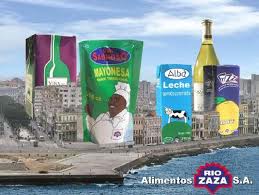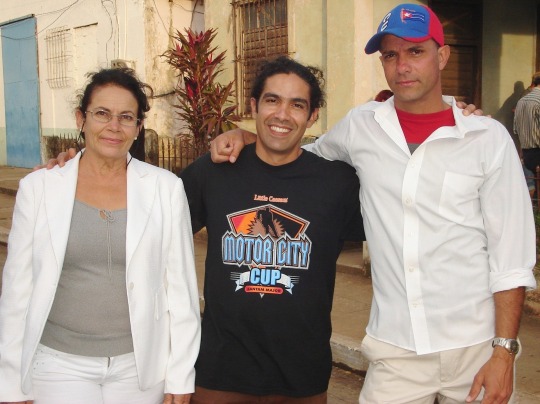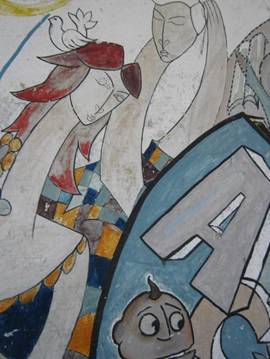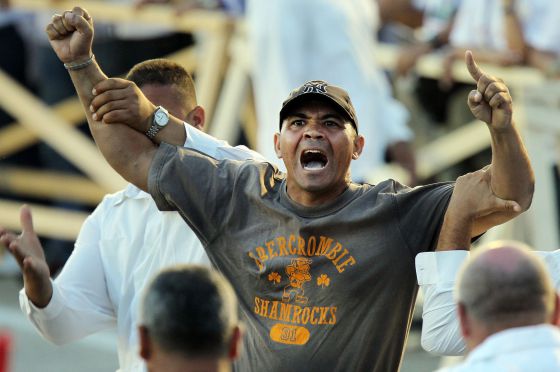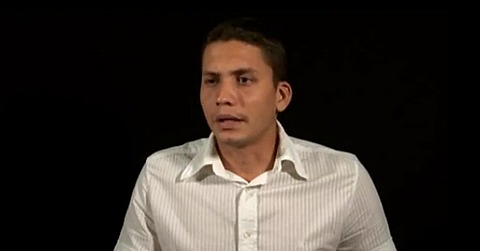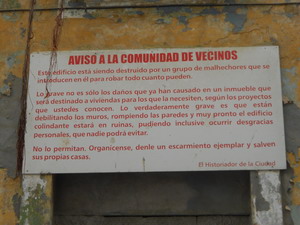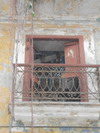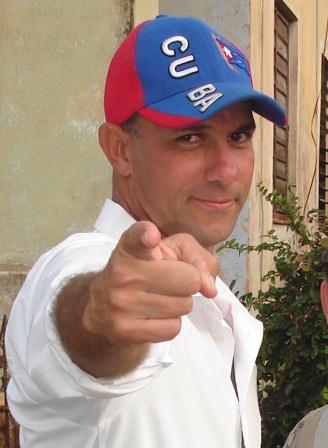 By Alfredo Felipe Valdés
By Alfredo Felipe Valdés
The professional trained for at least a decade, with a high educational rigor, who once he or she graduates has a high level of knowledge, is not treated by the State with the consideration deserved from the years and personal effort it took to complete the training.
This includes how other social sectors are vastly better paid despite not playing a social role even remotely comparable. This worker, who economically belongs to the medium-low social class, and leads a life of unjustifiable deprivation, has to witness how the government uses the results of his work as a trump card and banner to export an image of concern and anxiety for the good of the people and the rest of the Third World.
At this point the consolidated successes of past decades, such as the eradication of polio and other rash diseases by mass vaccination campaigns, and the low levels of infant and maternal mortality, are used to present them as achievements only possible under socialism, and are incorporated into the advertising discourse that seeks to mask the real social situation.
The Public Health Situation in Cuba
In 1964, the government of Fidel Castro took exclusive control of the Cuban Health System, just as it took control of most other spheres of social, economic, and political life in Cuba. For the half-century in which it has had this control, the Cuban government has presented the health system as a model to follow and did not hesitate to classify it as a “world power.” However, it is possible that in this area are seen most clearly the violations and trampling that for all these years have defined the relationship between the State and the individual. The most grave situations of this sector are described below.
Situation of Public Health Personnel
The professional trained for at least a decade, with a high educational level, who oncehe has graduated has a high level of knowledge, is not treated by the State with the consideration deserved from the years and personal effort it took to complete the training.
This includes the fact that other social sectors are vastly better paid despite their not playing a social role even remotely comparable. This worker, who economically belongs to the lower middle social class, and leads a life of unjustifiable deprivation, has to witness how the government uses the results of his work as a trump card and banner to export an image of concern and anxiety for the good of the people and the rest of the Third World.
At this point the consolidated successes of past decades, such as the eradication of polio and other such diseases by mass vaccination campaigns, and the low levels of infant and maternal mortality, are presented as achievements only possible under socialism, and are incorporated into the advertising discourse that seeks to mask the real social situation.
Health professionals face restrictions on travel, and are punished if they apply to do so
Deserving of special mention is the extreme subjection of all workers under the Ministry of Public Health (MINSAP) under Ministerial Resolution 54 of July 2, 1999, by the then Minister of Public Health, Dr. Carlos Dotres Martinez, which is one of the most exquisite aberrations dictated by the Cuban government. According to the terms of this Resolution, every employee under the Ministry of Public Health, who desires to go abroad, either temporarily or permanently, is forced to apply to the Ministry to be “released” from the public health sector; on submission of the application the employee is held by Ministry for a term of five years, with no exceptions.
This regulation applies equally to a recent graduate or to someone who has worked for 20 years, all will be held for at least 5 years before being allowed to travel. There are a great many cases where the prohibition on travel has been extended to 7 years. Even doctors and dentists who are already retired, are held for 3 years against their will by this former minister, who is not required to specify an exact term and who is the one who ultimately decides, according to his personal will, who will be “freed” and when.
During this time, this professional is given medical assignments, which are virtually forced on him, and which most of the time under spent deplorable conditions with regards to meals and often of hygiene; it is not uncommon for the staffof a polyclinic or hospital to have no running water for hand washing, the food is limited to a little rice, an egg and some root vegetable.
Salaries are low, and often not paid
The overtime medical shifts, are every 5 or 6 days, and the personnel is not paid for them for decades. Nor are they paid for seniority, bio-hazard risk, nor night shifts; for example, for many years nurses were paid the absurd figure of 6.00 Cuban pesos monthly for night shifts, that is about 30 cents on the U.S. dollar. Nor are those who take on teaching and administrative tasks — which adds $2 to $4 USD monthly to their salary — paid appropriately.
The Ministry of Work, through its Resolution No. 16 in 2005, fixed the basic monthly salary for this sector between 257.00 pesos (a little less than $13.00 USD) for technicians and 627.00 pesos (a little more than $31.00 USD) for specialized doctors at the second level. With this lean salary, this worker, given the high cost of living, will barely be able to feed his family for 10 days — as a result of which he is forced to engage in a variety of activities on the informal market or the black market.
In the case of doctors, this wage increase is around 48.00 pesos (less than $2 USD) relative to the monthly salary that they have at the moment. This was received by the workers with indignation and was seen to demonstrate a profound lack of respect. Despite this, the government then boasted about a disbursement of about 200 million pesos every year (about $8 million USD), of which only two would fall into the pocket of a mistreated doctor every month.
Asking for a raise brings loss of medical license
Amid these conditions, the aforementioned “augmentation” wage of 2005 led to two physicians, Drs. Rodolfo Martínez Vigoa and Jeovany Jimenez Vega, then working in the Guanajay municipality west of Havana Province, to draft a letter to then Health Minister Dr. José Ramón Balaguer Cabrera where they presented the majority opinion generated by this wage proposal.
To try to prevent their carrying forward with this initiative they were coerced and threatened in every way, including the classic acts of repudiation organized by the Party and the Union. This letter was endorsed by the signatures of 300 workers who shared their views and was delivered on November 11, 2005 to the Ministry of Public Health.
The Ministry never responded. The only response, was that the two doctors who had the initiative were barred from the practice of medicine throughout the country for an indefinite period, by a Ministerial Resolution that cannot be appealed.
To try to justify these penalties, those who handled the case resorted to falsification of documents and the manipulation and misrepresentation of facts, accusing both doctors of having deceived their colleagues by presenting them with a document unknown to them and which they covered up, at the time they collected the signatures. This was disproved by the copies of the document made at the time.
Here it is not possible to determine whether, at that time, there were similar reactions in other provinces, but it is suggested in the case as being very illustrative of the modus operandi that continues to be the posture of the State and the way in which the Ministry of Public Health solves its differences with its workers.
Any initiative, from any worker anywhere in Cuba will be treated in the same way. At the time of writing both physicians continue to be barred from practice, after 4 years, for something they never did. This abuse has gone on for years with the full knowledge of all the central authorities of this country, including the Attorney General, but remains unpunished.
One of these doctors decided to leave the country after 4 years of humiliation, He was required to apply for the aforementioned “liberation” from the Minister, but despite not having been a part of the Public Health System for 4 years, having been separated for from it against his will, the waiting time was determined to begin now so he will have to wait 5 additional years before he can leave.
This last evidence, even more than the rest of the elements outlined above, demonstrates that the Minister and other senior leaders of the circles of power in Cuba have no limits on their abuse and violation of the rights of workers this sector.
Primary and Secondary Health Care Understaffed and Undersupplied
The situation of care in primary health care has deteriorated considerably during the last decade as a direct result of the priority set for sending doctors and technicians to Medical Missions abroad, which now represents about half of practicing doctors. When a doctor leaves his workplace he does not always have an immediate replacement and generally the population is affected in various ways, either because the person who comes to relieve him only works part-time or because the patient has to move to a clinic further away and, because the clinics are now more crowded, the wait to be seen can extend to hours. In most cases, the Municipal Health Directors choose to concentrate the patient population in fewer clinics, given the scarcity of doctors working in primary care.
The doctor who is here to bear the work of those who leave. There have even been occasional very dramatic situations where a Polyclinic made up of 22 individual clinics has, for a time, had only two doctors overseeing all services.
It is valid to note that when any of these situations occurs, the doctor in question continues to receive exactly the same salary for taking on the work of their absent colleagues. It is even very common that an entire municipality or a territory will be deprived of certain specialty service because the only specialist has been sent abroad on one of those Missions.
For secondary care, the care situation also suffers from this involvement but rather more attenuated fashion, because the Medical Mission solicit all the specialists, especially the internal medicine specialists in primary care. In the case, more acute situations in hospitals and institutions are caused by problems of logistics and infrastructure assurance.
The doctor’s work is limited by the frequent lack of resources such as disposable material for clinical and surgical treatments, the limited availability of laboratory reagents, plates for x-rays, or even the drugs themselves are often lacking. This is compounded by the structural deterioration of many facilities that often do not have running water, have poor ventilation and no air conditioning. There are cases of Surgical Units closed for months because of structural problems.
Also affecting medical management is the dismal state of the available ambulances, which often results in the involuntary abuse of patients who have to wait, sometimes for 6 to 8 hours, to be transferred, sometimes in life-threatening clinical situations in which the time is critical.
The Problem of Infrastructure
Although a little over 5 years ago the country began a program of repair of many health facilities — in most cases the only repairs in decades — this did not reach all of them nor did it always end with the best quality, as is usual when the reconstructions are excessively delayed and at times what should take months takes years, which is causing inconvenience to the population, the theft of construction materials, and results in cost increases for the final execution of the work.
Generally, once the repairs are finished, there is no follow-up with regular maintenance, which is causing us to already see signs of deterioration in these new facilities.
In primary care we see a heterogeneous situation. The original plan, from over two decades ago, was to ensure one typical doctor’s office — with a doctor, nurse and all equipment — for every 120 families. Thanks to the progressive deterioration over the years, in the current state we can’t say precisely the number of patients per doctor, but it can rise to the thousands, and sometimes there is a sixth year intern to help.
This typical office model has only been preserved in a handful of cases, and in general over the years has been taken over clinic, which, in the best of cases, are located in homes confiscated from people who emigrated, or some vacant locale adapted for this use. As a general rule, the typical site is small, badly lit and ventilated even worse, in most cases without running water for hand washing.
In secondary care, save in fortunate exceptions, the majority of hospitals are more or less markedly deteriorated structurally, with a lack or scarcity of running water in the rooms, sanitary facilities in a deplorable state, bad conditions with regards to cleanliness, and often infested with insects and the associated risk of spreading hospital-acquired infections.
Medical Education: Creating a University in Every Large City
The so-called “municipalization” of university education, that is, the intention to create a university in each municipality in this country, has had a detrimental impact on the quality of teacher education, at least in the case of medicine. This experiment, conducted over the last decade, emerged as a direct result of the arrival of tens of thousands of students of the Latin American Medical School (ELAM) following the disaster of Hurricane Mitch.
And it’s very good to help others, but everything should be studied carefully and they should create the infrastructure necessary so that this does not lead to problems, especially if it is ultimately decided to extend the ELAM program beyond the 10 graduate programs included at the time the idea was launched.
Foreign students displaced Cuban students at the historically recognized faculties in the City of Havana, and from the provincial capitals to the municipalities, where now the Cuban student sits in front of a computer and takes lessons from teachers who often are not prepared with the rigor that this level of education requires.
The results of the above combination and the desire to produce graduates at all costs and at any price to ensure the continued availability of relief staff to cover Cuba’s Medical Missions abroad, has been to weaken every link in the teaching chain. During the last decade and at least until last year, there has been a degeneration of the requirements demanded at all levels.
Simply to detail them: the high school graduate who already carries the aftermath of the failed counterpart experiments in previous levels of education, comes with a poor background, and the grade point average required to enter these careers is increasingly dropping. The study of the preclinical subjects that were once taught in prestigious schools such as the Victoria de Girón Institute (Bay of Pigs Victory Institute), by teachers with decades of experience in their subject, are now taught at a computer in a local polyclinic with teachers who are just starting out.
Then for the rest of the stage of clinical training the student would assist only twice a week at the hospital. In his sixth year he would complete the internship stage, decisive in the consolidation of the knowledge of the future graduate, by standing in at a clinic and performing the work of a doctor who would be on a Medical Mission abroad.
Now graduated, this young doctor might complete the specialty of General Medicine (MGI) in just 2 years, when the traditional method before 2000 required a total of 4 years. And to take it one step further, this MGI resident can do a second, so-called “parallel specialty,” for example ophthalmology, and will graduate from both specialties in just two years, although the combined specialties may be as complex as Intensive Care Medicine and Anesthesiology.
Students of different Health technologies, after passing the first semester but without completing the first year of training, have been sent to any of these dozens of Medical Missions in Third World countries which, incidentally, have netted the Cuban government, in recent years, billions in hard cash dollars.
Artemisa, Provincia La Habana. October 2010.
Published on the Internet by Alfredo Felipe Valdés, before leaving for exile in Spain with his family, as part of what he called “Cuba Report.”
Originally posted on Citizen Zero Blog: February 22 2012


